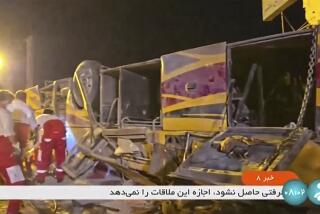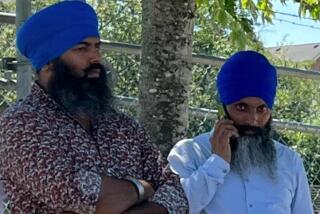Iraq bombings targeting Shiites kill 71
A string of explosions targeting Shiite Muslims that killed at least 71 people bore the hallmark of Sunni Arab insurgents who have a history of trying to capitalize on tensions among Iraqi politicians to reignite the communal violence that nearly tore the country apart.
The bombings Thursday in the south of Iraq and in mainly Shiite neighborhoods of the capital, Baghdad, were the second major wave of attacks since the last U.S. troops departed from Iraq less than three weeks ago.
Sectarian tension has escalated sharply as a political dispute threatens to unravel U.S.-backed power-sharing arrangements among the country’s Shiites, Sunni Arabs and ethnic Kurds.
There was no immediate claim of responsibility. But Sunni insurgents linked to Al Qaeda frequently targeted Shiites with coordinated bombings during the bloodshed that pushed the country to the brink of civil war five years ago.
“Definitely ... there is a relationship between these explosions and the political crisis, but it doesn’t mean necessarily that one of the sides in the crisis is directly responsible,” said Dhiya Shikerchi, an Iraqi political analyst.
Shikerchi raised the prospect that a separate entity was trying to exploit political tensions to return the country to sectarian strife.
So far, there is no sign that Shiite militias are taking the bait. Instead, the political movement of radical Shiite cleric Muqtada Sadr, whose militia was blamed for near-daily kidnappings and killings at the height of the sectarian fighting, called on government forces to improve their security plans.
The risks of sectarian conflict go well beyond Iraq. Turkey’s Anatolian news agency quoted that country’s foreign minister, Ahmet Davutoglu, as warning that Sunni-Shiite tensions could throw the Middle East into a “regional Cold War.” Davutoglu’s comments this week were published on the eve of a visit to Iraq’s powerful neighbor, predominantly Shiite Iran.
In Iraq, fear of retaliation has already prompted some Sunnis to flee predominantly Shiite neighborhoods of Baghdad, a reminder of the worst days of the sectarian strife that eased only after the U.S. military increased its troop strength and formed alliances with Sunni tribal leaders to fight Al Qaeda and its affiliates.
“Such incidents increase our fears that the violence will mount,” said Ali Mohsen Chiyad, a 31-year-old Shiite day laborer who saw a ball of fire and smoke rising before him from a blast in Baghdad’s Sadr City neighborhood. “These political problems and differences among the politicians encourage the terrorists to work, in my opinion.”
Despite concerns about Iraq’s stability, the Obama administration could not reach agreement with Prime Minister Nouri Maliki’s government about a continuing U.S. military role in Iraq. Under an agreement reached by the George W. Bush administration, the last U.S. troops left Iraq on Dec. 18.
National Security Advisor Falah Fayadh sought to deflect criticism that Iraq’s security forces weren’t up to the task, telling the U.S.-funded Alhurra satellite television network that there were even bigger attacks when U.S. troops were present.
“Such incidents are not connected with the American presence or their withdrawal, but with a terrorist agenda which tries to disrupt the future of Iraq and Iraqis,” he said.
Police and hospital officials said the day’s toll across the country was at least 71 dead and hundreds injured.
In the deadliest attack, a suicide bomber blew himself up among pilgrims who were walking to the Shiite holy city of Karbala before an important religious holiday, killing 44 people, said Sajjad Asadi, head of the provincial security committee in Nasiriya.
The explosion happened at a rest stop set up at a checkpoint near Nasiriya, which is about 200 miles southeast of the capital, Baghdad. Jaafar Hashim, a 42-year-old English teacher from Nasiriya, was less than 100 yards away.
“Pieces of flesh, clothes and shoes are scattered in the place,” he said. “I even saw strands of girls’ hair.”
Earlier Thursday, four bombs exploded in the Baghdad neighborhoods of Sadr City and Kadhimiya, killing at least 27 people, police and health officials said.
The explosions began about 7 a.m., when a bomb attached to a motorcycle detonated in an area of Sadr City where day laborers wait for work and vendors sell food, police and witnesses said. A roadside bomb then exploded nearby.
At least 12 people were killed and 34 injured in the two blasts, officials said. Security forces also found two unexploded devices in the area, they said.
In Kadhimiya, which is home to a revered Shiite shrine, two car bombs exploded within minutes, killing at least 15 people and injuring 37, officials said.
Thursday’s attacks were the deadliest since Dec. 22, when a string of bombings in mostly Shiite neighborhoods of Baghdad killed 71 people.
The violence took place amid a political standoff between factions representing the Shiite majority, which dominates the government, and the Sunni minority that ruled under the late Saddam Hussein.
Last month, an arrest warrant was issued for the country’s Sunni vice president, Tariq Hashimi, on accusations that he ran a death squad that targeted government officials. Hashimi says the charges are politically motivated. He has retreated to Iraq’s semiautonomous Kurdish region, where he is beyond the reach of the Baghdad security forces.
Maliki, a Shiite, has also called for a vote of no confidence in his Sunni deputy, Saleh Mutlak, who had likened him to a dictator.
Iraqiya, the political bloc to which Hashimi and Mutlak belong, has been boycotting parliament and Cabinet sessions to protest what it describes as Shiite attempts to consolidate power and marginalize Sunnis. But seven members broke ranks to attend parliament Thursday, saying they respect their oath of office and their voters.
In a bid to defuse tensions, Maliki met Thursday evening with parliament Speaker Usama Nujaifi, a Sunni. Both leaders condemned the bombings. They described the meeting as positive and said they had hopes of finding a political solution.
Special correspondent Salman reported from Baghdad and Times staff writer Zavis from Beirut.
More to Read
Sign up for Essential California
The most important California stories and recommendations in your inbox every morning.
You may occasionally receive promotional content from the Los Angeles Times.









